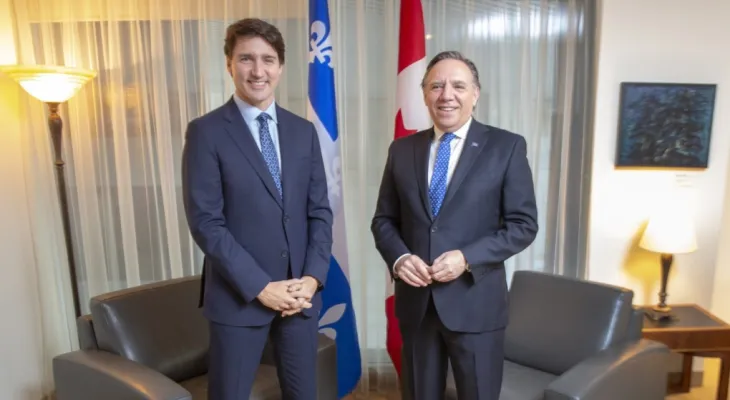Search here
Newspaper
Search here

Arab Canada News
News

Published: January 18, 2024
Quebec Premier François Legault asked Prime Minister Justin Trudeau to slow the flow of asylum seekers entering his province, which he said is nearing a "breaking point."
Legault made his request in an official letter to Trudeau sent Wednesday afternoon, which Canadian media obtained a copy of.
Legault wrote: "We are very close to a breaking point due to the excessive number of asylum seekers arriving in Quebec month after month. The situation has become unsustainable."
He said, "In 2022, Quebec received more asylum seekers than the rest of the country combined."
Legault added that the closure of the Roxham Road unofficial crossing point south of Montreal in August 2023 led to a "momentary" slowing of the flow; however, the number of arrivals continued to increase in airports. Also, the number of people arriving on visitor visas and applying for asylum is increasing significantly."
The Premier wrote that nearly 60,000 new asylum seekers were registered in Quebec in the first 11 months of 2023, putting "very significant pressure" on services.
The letter stated that "asylum seekers are struggling to find places to live, which contributes to worsening the housing crisis." "Many end up in overcrowded homeless shelters," and organizations that help asylum seekers cannot keep up with demand.
Legault noted that children of asylum seekers are putting significant pressure on schools already suffering from teacher and space shortages.
The Prime Minister reminded Trudeau that asylum seekers waiting for work permits receive financial assistance from Quebec. Last October, 43,200 asylum seekers received assistance amounting to $33 million.
Legault expressed particular concern about Mexican citizens, who he said represent a growing proportion of asylum seekers coming to the province, saying "the ability to enter Canada from Mexico without a visa certainly explains part of the asylum seeker flow."
He added that "airports, especially in Toronto and Montreal, have become sieves, and it is time to take action."
This is not the first time Legault has written to Trudeau on this issue. In February, the Premier told another letter that Quebec's capacity to receive refugees had been greatly exceeded.
Legault is formally requesting the Prime Minister to tighten visa policies and is also seeking "fair" distribution of asylum seekers across Canada, possibly by bus transfer to other provinces, and asking Ottawa to reimburse Quebec $470 million spent on receiving asylum seekers in 2021 and 2022, and to do the same in subsequent years.
He concluded: "Quebec is no longer in a position to welcome a disproportionate share of asylum seekers entering Canada." "This is an urgent matter of utmost importance."
On Tuesday, Trudeau confirmed his government's commitment to welcoming 500,000 new permanent immigrants annually by 2025. However, he told the Montreal Metropolitan Chamber of Commerce that his government wants greater control over temporary immigration, such as international students and temporary workers, whom he welcomed, saying it would have a greater impact on the housing crisis.
Trudeau called on higher education institutions and businesses to find their own housing solutions for these temporary residents.
Minister of International Relations Dominic LeBlanc said on Thursday that Quebec has welcomed more than its share of asylum seekers and that he takes the province's reimbursement request seriously, but LeBlanc did not commit to relocating asylum seekers to other parts of the country.
LeBlanc said in a statement posted on platform X, formerly Twitter: "We are committed to working with the Government of Quebec to find solutions to the challenges posed by the large number of asylum seekers Quebec is receiving."
"In addition, we are evaluating all possible measures to allow asylum seekers to travel to other provinces if they wish."
Quebec Party leader was not impressed by Legault's letter. Paul Saint-Pierre Plamondon described it as a "symbolic" gesture and challenged Legault to demand full immigration powers from Ottawa.
Comments